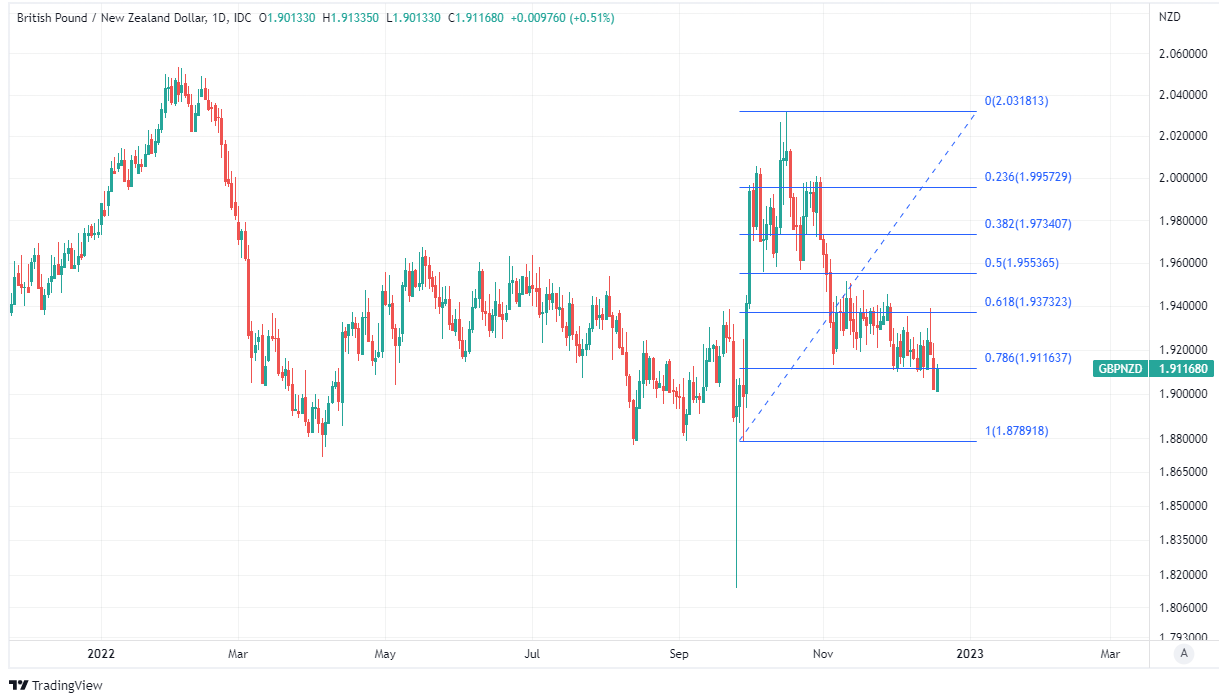GBP/NZD Week Ahead Forecast: Supported Near 1.90
- Written by: James Skinner
-
- GBP/NZD draws bid & attempts recovery from 1.90
- Could remain supported heading into festive holiday
- But economic divergence set to persist as headwind

Image © Adobe Stock
The Pound to New Zealand Dollar rate climbed from near three-month lows to open the new week and could be likely to remain buoyant in the days ahead but a resilient Kiwi and divergence of fortunes between the New Zealand and UK economies remains a headwind for GBP/NZD.
New Zealand's Dollar was an underperformer on Monday while Sterling was able to pare earlier losses against many G20 counterparts, leading GBP/NZD to rise from Friday's lows close to the round number of 1.90, which had also been its weakest level since late September.
"The BusinessNZ Performance of Services index showed a noteworthy deterioration in the November reading that was released overnight," says Stephen Gallo, European head of FX strategy at BMO Capital Markets.
"In conjunction with this data, the 2Y swap rate differential showed the NZD-denominated rate losing about 4bps against its USD-denominated equivalent during onshore trading hours. In FX, NZD is the 2nd worst performing G10 currency over the past 24H," Gallo adds in a Monday market commentary.
Earlier losses for Sterling had followed a flurry of official statistics highlighting the apparently more resilient condition of the New Zealand economy including third-quarter GDP data that was more than twice as strong as the Reserve Bank of New Zealand (RBNZ) forecast for the period.

Meanwhile, GDP for October and retail sales for November provided further evidence of a recession in the making in the UK where the details of the latest Bank of England (BoE) interest rate decision also left a sour taste in the mouth of the market on Thursday with adverse implications for Sterling.
The BoE lifted Bank Rate to 3.5%, bringing the 12-month increase to 340 basis points and making for the strongest tightening of monetary policy since the period between May 1988 and October 1989 when the Minimum Band 1 Dealing Rate doubled from 7.37% to 14.87%.
But two on the Monetary Policy Committee voted to leave Bank Rate unchanged in response to signs of a deteriorating labour market and economy, making for a dovish tilt that leaves the BoE's policy stance standing in contrast to the very hawkish position of the RBNZ.
"We expect the holidays to be punctuated by volatility, and this week is just the start of that," says David Croy, a strategist at ANZ, whose forecasts suggest the Pound to New Zealand Dollar rate is likely to end the year around 1.9047.
"New Zealand has high bond yields and recovering exports, but the US has a higher policy rate and safe haven considerations. Amid volatility, that may extend the USD’s bounce," Croy writes in a Monday research briefing.
While last week was all about central bank policy decisions, position squaring is likely to be a more dominant influence in the days ahead of the festive holidays and with potentially supportive implications for the Pound to New Zealand Dollar rate, which often benefits from volatility in global markets.
Much also depends on price action in the main Kiwi exchange rate NZD/USD, however, as rallies here can frequently have the effect of stifling GBP/NZD.
"NZD/USD can trade near current levels in thin trading over holiday period," writes Joseph Capurso, head of international economics at Commonwealth Bank of Australia, in a Monday market commentary.
"Any moves are likely to be driven by news around the global economy and developments in China. The hawkish RBNZ can provide a floor under NZD/USD. AUD/NZD is undervalued according to our fair value model so any dips in this currency pair are unlikely to be sustained for long," he adds.
The highlight of the week ahead is Friday's release of the Personal Consumption Expenditures (PCE) inflation readings in the U.S. and economists will be looking to see these confirm the further softening of inflation pressures indicated by the consumer price inflation indices for October and November.
Such an outcome could be supportive of NZD/USD heading into the new year period and a headwind for any Pound to New Zealand Dollar recovery.

